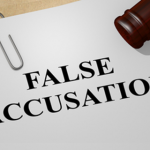The Startling Truth about AVOs and Family Law

Statistics reveal that 1 in 3 Australian women experience physical violence over their lifetime.
Family violence is being increasingly recognised as a widespread and serious issue in Australia with significant negative social, individual and community impacts.
A powerful weapon against family violence is the use of Apprehended Violence Orders (AVOs) to protect victims of family violence.
Sadly, sometimes AVOs are taken out for the wrong reasons and can lead to far-reaching detrimental consequences for the accused.
Family Violence & AVOs
Family violence can include an assault, stalking behaviour, causing damage to property, or even unreasonably withholding financial support from a family member or a child.
Section 4AB of the Family Law Act 1975 (Cth) defines family violence as:
‘Violent, threatening or other behaviour by a person that coerces or controls’ their family member, or causes that family member to be ‘fearful’.
A person in need of protection (PINOP) from family violence can apply to the police for an AVO on their own behalf or on behalf of their children if they suffer from, are exposed to or are fearful of violence from another person.
It is important to note that a child is exposed to family violence if the child sees or hears family violence or experiences the effects of family violence.
A police officer can also apply for an AVO on behalf of an alleged victim.
Applying for an AVO
After the complaint of violence, the police will commence proceedings in a Local Court.
A provisional AVO can be administered at this point by the police if the allegations of violence are serious.
In court, the defendant will either agree to the AVO or, if they dispute it, the matter will go to a hearing.
It is then up the Magistrate to decide whether the facts justify an AVO being imposed against the defendant.
If an AVO is imposed, this will prohibit the defendant from being violent or intimidating to the person in need of protection.
There may be other conditions also included in the AVO, such as not being able to be around the PINOP
Contravening the order is a criminal offence.
Making a police report for a police AVO or filling out an AVO form privately is relatively quick and straightforward.
If an AVO is taken out for the wrong reasons, however, this can cause negative effects for the accused in cases where there was no evidence of family violence.
The Harmful Effects of AVOS on Family Law Proceedings
The difficult and emotionally fraught nature of a relationship breakdown often leads to a number of disputes over finances, access to children and other complicated family law matters.
Unfortunately, disputes such as these tempt one party to go to the police about the other’s behaviour, and in doing so, exaggerate or falsify information which brands the other person as being violent.
Regrettably, this means that an AVO can become a strategic manoeuvre used by parents who are fighting over their children.
Unjustified AVOs come at a high price.
They complicate and prolong family court proceedings and destroy any chance of future co-parenting between the parties.
This particularly hurts the children of the relationship.
If the other party has taken out an unjustified AVO against you, it is important to respond calmly and constructively.
Although contravening an AVO is a criminal offence, merely having the AVO taken out against you is not.
Many parties do not contest an AVO that has been taken out against them for a variety of reasons.
For example, choosing not to contest an AVO is cheap and quick.
An uncontested AVO is normally finalised as ‘without admissions’, and therefore no finding of guilt.
The contents of the ‘grounds of complaint’ will have not been established.
However, before agreeing to it, you must consider the potential consequences the AVO will have upon your ability to obtain licenses such as firearm or security licenses, and the impact upon family law proceedings.
The fact than an AVO exists is often used by the PINOP to suggest the defendant is violent or otherwise unsuitable as a parent – even if the AVO was accepted without admissions.
It may also be grounds for one parent to force the other parent to have supervised contacts with the children, thus creating an additional barrier for the parent who is not able to interact freely and without observation with their own children.
An Unacceptable Risk
In the case of M v M, a wife accused her former husband of sexually abusing their daughter.
The Judge was not satisfied that sexual abuse had occurred on the balance of probabilities.
However, he found that he also could not rule it out completely.
On this basis, the father was deprived of access to his daughter, as the Judge declared there was an ‘unacceptable risk’ to the child despite no definitive finding on the facts.
This creates an unfair situation where those who are merely accused of committing offences do not even have to be prosecuted, let alone found guilty, but can have their rights deprived nonetheless.
The result of M v M meant that once an allegation of abuse has been made by one of the parties, it was now impossible for judges to ignore.
The ‘unacceptable risk’ test is tailored to the severity of the allegation and the nature and degree of the risk.
This means that if the allegations have potentially high consequences, the standard of proof will be higher than if the allegations will result in little/minimal impact to the children.
Fortunately, it seems judges in the Family Law Courts are becoming more and more aware of unjustified AVOS.
Before deciding what you will do any AVO, we recommend that you consult your family lawyer and ask for advice on how it will impact your current or any future family law proceedings.
Justice Family Lawyers are experienced at all matters related to divorce, child custody and financial separation. They are specialist family lawyers Sydney based and proud to contribute to the Sydney Criminal Lawyers® blog.





